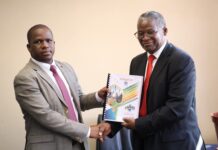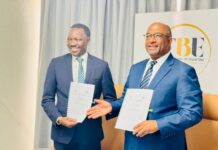
His Majesty King Mswati III’s visit to New York for the 80th United Nations General Assembly (UNGA) comes at a pivotal moment, not only for Africa but also for Eswatini.
With the continent standing at a crossroads with its young population poised to transform global labour markets, even as persistent barriers hold back growth, His Majesty has placed Eswatini firmly within the international spotlight.
From peace and security to health and climate change, the monarch has used the global stage to link Africa’s future to the country’s priorities, showing that even a small kingdom can shape the debates that define the continent’s trajectory. This analysis revisits his interventions day by day, beginning with his opening call that set the tone for a week of diplomacy and high-level engagement in New York.
– DAY 1: Opens UNGA visit with strong call for Africa to match ambition with delivery
His Majesty King Mswati III began his engagements in New York ahead of the 80th United Nations General Assembly with a pointed call for African states to close the widening gap between lofty aspirations and the continent’s lived reality.
Represented by Minister of Finance Neal Rijkenberg at the global launch of the Africa Strategic Investment Alliance (ASIA), the king spoke of Africa’s “huge ambition not aligned with its reality,” urging leaders to pursue pragmatic, tested solutions to turn vision into action.
The initiative spearheaded by the AeTrade Group under the theme ‘Uniting people, capital and prosperity, is designed to align public policy with private capital in order to stimulate inclusive growth, particularly for women and youth.
Framed as a mechanism to channel resources towards the continent’s small and medium-sized enterprises (SMEs), the Alliance aims to tackle Africa’s staggering US$330 billion annual financing gap.
In his message, the king stated that Africa’s demographic trajectory requires urgent economic re-configuration.
By 2030, the number of young Africans entering the labour force will rise to 375 million, with the International Monetary Fund projecting over 20 million young people joining the workforce annually by 2035, more than the rest of the world combined.
“This imbalance between supply and demand of jobs, compounded by a mismatch of skills, presents one of the continent’s greatest risks,” the king warned.
His call was not simply for more jobs, but for a comprehensive ecosystem that leverages digital technology, to empower youth and women-led businesses, enabling SMEs to serve as engines of growth under the African Continental Free Trade Area (AfCFTA).
Eswatini has pledged catalytic funding of US$5 million (approximately E100 million) to the new structure, a move His Majesty framed as both a national commitment and a challenge to fellow African leaders to mobilise resources in a similar spirit.
He announced plans to lobby traditional leaders and Heads of State to channel domestic funds into Africa Investment Strategic Alliance (ASIA), a sign of his intent to transform rhetoric into concrete pledges.
The platform itself has attracted significant international attention, with the United Nations Deputy Secretary General Amina Mohammed, the African Union Commission leadership, the Secretary General of the AfCFTA, and senior UNDP figures all present. AeTrade CEO Mulualem Syoum described the Alliance as “open to all those interested in inclusive growth,” while UNDP’s Ahunna Eziakonwa emphasised the resilience of African women and youth in the informal economy.
While much of the attention fell on the Pan-African initiative, His Majesty’s bilateral meeting with President Berdimuhamedow provided another layer to his first day. Taking place at the Mandarin Hotel, the encounter reaffirmed the budding relationship between Eswatini and Turkmenistan, formalised only last month during the king’s visit to Ashgabat.
The two leaders explored cooperation in ICT, agriculture, energy, textiles and mining, sectors of particular relevance to Eswatini’s growth strategy.
The kingdom expressed interest in Turkmenistan’s experience with satellite technology and desert agriculture, while Ashgabat showed keenness to engage with the country’s textiles sector and sugar exports.
– DAY 2: Sharpens Africa’s voice against coups
The second day of His Majesty King Mswati III’s engagements at the 80th United Nations General Assembly (UNGA) was defined by a forceful call for Africa to stand united against unconstitutional changes of government.
Speaking through the African Union (AU) Peace and Security Council (PSC), His Majesty condemned coups in all forms and urged continental leaders to codify firm consequences for any regime that seizes power by force.
Addressing the AU Observer Mission’s gathering on the sidelines of the General Assembly, the king highlighted that “no matter how popular a coup might seem, it must face consequences rather than acceptance.”
His words were aimed at reinforcing the AU’s longstanding doctrine of zero tolerance for unconstitutional changes of government, enshrined in the organisation’s 50th Anniversary Solemn Declaration and Agenda 2063.
The king cautioned that recent coups across Africa risk undermining democratic consolidation, stability and development.
He cited the need for both the African Union and the United Nations to act decisively in ensuring that no military takeover receives international legitimacy. His message was unambiguous: coups are not simply a policy issue, but ‘a moral imperative’ demanding rejection.
The AU Peace and Security Council, of which Eswatini is a member for the 2025–2028 term, has grappled with repeated suspensions of member states following military interventions in politics, from Mali in 2020 and Sudan in 2021 to Niger in 2023.
Each case has tested the AU’s ability to enforce its principles through suspensions, sanctions and diplomatic pressure. His Majesty’s intervention sought to sharpen the PSC’s resolve to act consistently and decisively.
In his remarks, the king also proposed strengthening the PSC’s role by codifying best practices from past interventions and creating a compliance mechanism under the AU General Assembly with binding timelines.
He reiterated the call for fully operationalising the African Standby Force, enhancing financing through the AU Peace Fund, and forging innovative partnerships to address both resurgent conflicts and new threats such as climate-related instability and transnational crime.
The monarch further urged harmonisation of protocols with the United Nations Security Council, the European Union, Regional Economic Communities and the League of Arab States to ensure joint early warning and coordinated action — always under African leadership.
On global governance reform, His Majesty again endorsed the Ezulwini Consensus, demanding permanent African representation on the UN Security Council.
He called attention to the fact that for him, the denial of Africa’s seat at the top table continues to weaken the continent’s influence on decisions that directly shape its peace and security environment.
Framing his speech in the language of duty and unity, the king argued that this generation of African leaders must move “beyond rhetoric, with courage and unity,” to silence the guns and guarantee future generations a continent defined by peace rather than recurring conflict. His conclusion placed responsibility firmly on African Heads of State and government to protect the integrity of the AU’s conflict resolution mandate and to act with consistency.
8 Ministers advancing parallel tracks
Alongside the king’s interventions, members of the ministerial delegation advanced the country’s agenda across health and climate diplomacy, securing critical commitments in HIV prevention, global health security and climate resilience.
Minister of Health Mduduzi Matsebula welcomed UNAIDS’ announcement of a dramatic price cut for lenacapavir, a breakthrough long-acting HIV prevention drug.
The price reduction, from US$28,000 per patient annually to just US$40, was hailed as a ‘watershed moment’ by UNAIDS and was described by Matsebula as ‘timely for Eswatini,’ given the country’s persistently high rate of new infections among women of childbearing age.
Matsebula, joined by the National Emergency Response Council on HIV/AIDS (NERCHA) leadership, confirmed the countrywould be among the first countries to roll out lenacapavir, with a pilot launch planned for World AIDS Day and wider distribution beginning in January 2026. Funding pledges from UNAIDS and PEPFAR are expected to support an initial 16.
– DAY 3: Positions Eswatini at the Heart of Climate Action
His Majesty King Mswati III’s third day in New York for the 80th session of the United Nations General Assembly underscored the country’s determination to position itself as a credible voice in the global climate debate while also engaging in high-level discussions on economic transformation and international cooperation.
From unveiling an ambitious emissions reduction target to joining world leaders at one of the world’s most influential private forums, the king sought to demonstrate that small states can carry both weight and vision on matters shaping the 21st century.
At the heart of the day’s programme was the presentation of the country’s updated climate commitments, encapsulated in the country’s third-generation Nationally Determined Contribution (NDC 3.0).
The plan is both bold and sobering: to cut 2.24 million tonnes of greenhouse gas emissions by 2035, at a cost of approximately E43 billion (US$2.4 billion). For a country with modest resources and low global emissions, it is a striking pledge, aimed as much at inspiring international solidarity as at setting a domestic course towards resilience.
The king’s announcement was informed by the kigdom’s recently concluded Risk and Hazard (RH) analysis, a comprehensive assessment that charts the nation’s exposure to climate-driven threats.
The study paints a stark picture of the challenges ahead. Without urgent action, droughts, floods, food insecurity and health crises are projected to intensify, with disproportionate effects on vulnerable groups such as rural communities, women, young people and persons with disabilities.
The analysis highlights the agriculture, water and energy sectors as most at risk, demanding urgent interventions in climate-smart farming, renewable energy and integrated disaster financing.
It is this grounding in empirical data and national consultation that gives NDC 3.0 its robustness. Unlike its predecessor, NDC 2.0, which struggled to attract sufficient financing, raising just US$449 million of the targeted US$900 million to US$1.5 billion, the new plan is designed with a clearer roadmap and stronger institutional alignment.
By tying the NDC 3.0 to the 2023–2028 National Development Plan and the country’s long-term Low Emissions Development Strategy, government has sought to place climate action at the centre of national planning rather than on its margins. His Majesty emphasised that laws will be reformed and institutions strengthened to ensure effective monitoring, accountability and delivery.
The financing gap remains daunting. Of the E43 billion required, an estimated E36 billion must come from external sources. His Majesty used the platform to issue a clear call to international partners, multilateral agencies and the private sector to scale up predictable and sustainable climate finance.
In his words, Eswatini is determined “to turn vulnerability into resilience,” but it cannot do so alone.
The appeal resonated with ongoing debates within the UN about the adequacy of global climate finance. Many African nations argue that despite contributing little to the climate crisis, they bear its harshest consequences and therefore deserve not only pledges but disbursed funds.
The country’s case, framed around a concrete emissions target and a detailed action plan, adds weight to that argument.
In presenting Eswatini as a “net carbon sink,” His Majesty reminded the world that the country’s ecological footprint is already outweighed by its natural absorptive capacity.
Yet the commitment to further reduce emissions underscores a willingness to lead by example. Plans include scaling up renewable energy, investing in waste management and water systems, developing early warning systems, and supporting vulnerable communities with affordable climate-smart technologies.
The framing was strategic: Eswatini is not merely a victim of climate change but an active player seeking to turn climate challenges into green growth, food sovereignty and shared prosperity, which aligns with wider African Union messaging, which positions the continent as a site of solutions as much as of needs.
8 Engaging Global Leaders at Bloomberg Forum
If the climate announcement showed Eswatini’s resolve, His Majesty attended the 2025 Bloomberg Global Forum, demonstrating his intent to place the kingdom within broader conversations on economic transformation and global cooperation.
Hosted by Michael Bloomberg, founder of Bloomberg LP and Bloomberg Philanthropies, the forum has grown into one of the most prestigious platforms for heads of State, CEOs, philanthropists and innovators to grapple with pressing global challenges. This year’s theme centred on the future of globalisation, sustainable growth and Africa’s role as a hub for investment and innovation.
His Majesty joined a distinguished line-up including World Bank President Ajay Banga, Gates Foundation Chair Bill Gates, Jane Goodall, African Development Bank President Dr Sidi Ould Tah and global business leaders such as Goldman Sachs CEO David Solomon and Alphabet President Ruth Porat. Key discussions focused on creating sustainable employment for 1.2 billion young people expected to enter the global workforce in developing economies over the next decade. The session underscored the links between climate resilience, economic opportunity and political stability—a triad of issues highly relevant to Eswatini.
Another highlight was a dialogue on developing Africa’s sports and entertainment ecosystem, an area increasingly recognised for its potential to drive economic diversification and attract sustained investment.
The forum also served as a launchpad for Bloomberg Philanthropies’ US$75 million Global Vision Initiative, aimed at tackling untreated vision impairment affecting one billion people worldwide.
The initiative, delivered in partnership with Warby Parker, Aravind Eye Care System and the World Health Organisation, will provide screenings, eyeglasses and cataract surgeries across multiple continents.
Though not directly linked to the country’s policy agenda, the initiative exemplified the kind of cross-sectoral partnerships His Majesty has long championed. It is precisely this blend of public policy, private investment and civil society action that Eswatini hopes to mobilise in its own climate and development journey.
By the end of his third day in New York, His Majesty had positioned Eswatini as a country willing to stretch beyond its weight.
– Day 4: Leap into the Digital Future
His Majesty King Mswati III’s fourth day at the 80th United Nations General Assembly was marked by a landmark achievement that placed the kingdom at the cutting edge of global innovation.
The king launched a groundbreaking partnership with technology giant Google, Canadian space company Stardust and SHE Powers Africa, with strong backing from the United Arab Emirates.
The event, themed ‘Three Firsts for Africa’, underscored the country’s ambition to become a continental leader in digital transformation, artificial intelligence and even space technology.
The presence of top-level executives from Google, NASA representatives and senior UAE officials elevated the signing beyond a routine partnership, signalling international confidence in the Kingdom’s vision.
For His Majesty, the agreement was not just about acquiring new tools or technologies.
He framed the partnership as a bold step towards reimagining the country as an innovation hub, where youth are equipped with the skills to thrive in frontier industries such as biotechnology, cybersecurity, and artificial intelligence.
The king stated that such initiatives should be seen as catalysts for the Sustainable Development Goals, with the potential to create jobs, improve livelihoods and strengthen service delivery. Minister of Information, Communication and Technology (ICT) Savannah Maziya added a visionary layer to the announcement, declaring that Emaswati youth could now realistically dream of one day travelling to space.
She revealed that the MoU with Stardust includes plans to build capacity towards establishing a national space agency, with NASA involvement under discussion, putting emphasis on the fact that Eswatini should no longer be ‘a well-kept secret,’ but a continental leader in digital innovation.
The presence of UAE Minister of State Sheikh Shakhboot bin Nahyan Al Nahyan further underlined the growing strategic partnership between Eswatini and the Emirates.
The UAE has already played a key role in supporting the country’s ICT ambitions and its endorsement of this new initiative adds weight to the Kingdom’s positioning as a trusted partner in Africa.
Day four’s engagements therefore, reflected a forward-looking agenda: technology, space and innovation as tools for empowerment. For the country, the announcements symbolised both aspiration and commitment, the aspiration of a small nation to compete at the core of global progress, and the commitment of its leadership to secure partnerships that bring those dreams within reach.







